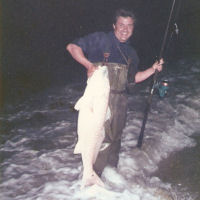
Peter A. Van Veld
Faculty Emeritus
Retired:
2014
Department:
Aquatic Health Sciences
Email:
[[v|vanveld]]
Interests:
Toxicology; biochemical response to pollution exposure.
Education
- B.S. University of North Carolina at Chapel Hill
- M.S. William & Mary
- Ph.D. University of Georgia
Research Interests
Our laboratory focuses on biochemical and molecular responses in marine organisms to environmental pollutants and pathogenic organisms. These responses often occur during early stages of disease and can therefore serve as biomarkers or early warning signals of exposure and effects. In addition, biochemical and molecular responses can lead to a better understanding of mechanisms of toxic action and biochemical defense.
Recent and ongoing projects:
- Dietary Modulation of Innate Immunity to Mycobacteriosis in Striped Bass (Morone saxatilis). Funded by NOAA.
- Effects of Delaware Bay Water and Endocrine Disrupting Compounds on Horseshoe Crab (Limulus polyphemus) Embryonic Development and Survival. Funded by USFWS.
- Biomarker responses in eastern mosquitofish (Gambusia holbrooki) during life-cycle exposure to biosolids. Funded by the Virginia Water Resources Research Center.
- Development of a Portable, Universal Assay for Determination of Gender and Reproductive Status of Istiophorid Billfish. Funded by NOAA and the Gulf States Marine Fisheries Commission.
- Investigations of endocrine disruption in fish and amphibians exposed to poultry-litter derived contaminants. Funded by the Maryland Center for Agro-Ecology.
- Environmental transport, fate and ecological effects of steroids from agricultural application of poultry litter. Funded by U.S. EPA STAR.
Recent Publications:
- L. Iwanowicz, V Blazer, S. McCormick, P. Van Veld and C. Ottinger. Aroclor 1248 exposure leads to immunomodulation, decreased disease resistance and endocrine disruption in the brown bullhead (Ameiurus nebulosus). Aquat. Toxicol. (in press).
- G. Roesijadi, S. Rezvankhaha, A. Pereza, K. Torruellasa and P. A. Van Veld (2009) Dietary cadmium and benzo(a)pyrene increased intestinal metallothionein expression in the fish Fundulus heteroclitus. Mar. Environ. Res. 67: 25-30.
- L. D. Johnston, G. Brown, D. Gauthier, K. Reece, H. Kator and P. Van Veld (2008). Apolipoprotein A1 from striped bass (Morone saxatilus) demonstrates antibacterial activity in vitro. Comp. Biochem. Physiol. 151(B): 167-175.
- Van Veld, P.A. and D. E. Nacci (2008) Toxicity Resistance. In: The Toxicology of Fishes (R.T. Di Giulio and D.E. Hinton, Eds.) CRC Press, Boca Raton FL pp 597- 641.
- Sullivan , C., C. Mitchelmore, R. Hale and P.A. Van Veld (2007) Induction of CYP1A and DNA damage in the fathead minnow (Pimelphales promelas) following exposure to biosolids. Sci.Tot. Environ. 384: 221-228.
- Frederick, L.A., P.A. Van Veld and C.D. Rice. (2007) Bioindicators of immune function in creosote-adapted estuarine killifish (Fundulus heteroclitus). J. Toxicol. Environ. Health. 70: 1-10.
- Burnett, K.G., L.J. Bain, W.S. Baldwin, G.V. Callard, S. Cohen, R.T. Di Giulio, M. Gomez-Chiarri, M.E. Hahn, C.A. Hoover, S.I. Karchner, F. Katoh, D.L. MacClatchy , W.S. Marshall, J.N. Meyer, D.E. Nacci, M.F. Oleksiak, B.B. Rees, T.P. Singer, J.J. Stegeman, D.W. Towle, P.A.Van Veld, W.K. Vogelbein, A. Whitehead, R.N. Winn and D.L. Crawford (2007) Fundulus as the premier teleost model in environmental biology; Opportunities for new insights using genomics Comp. Biochem. Physiol. Part D 2: 257-286.
- Van Veld, P., B. Rutan, C. Sullivan, D. Johnston, C. Rice, D. Fisher, L. Yonkos (2005). A universal assay for vitellogenin in fish mucus and blood. Environ. Toxicol. Chem. 24: 3048-3052.
- Burge, E., D. Gauthier, C. Ottinger and P. Van Veld. (2004) A mycobacterium-inducible Nramp in striped bass (Morone saxatilis). Infection and Immunity. 72: 1626-1636.
- Burge, E.D., D.T. Gauthier and P.A. Van Veld (2004). In vitro response of the striped bass natural resistance-associated macrophage protein, Nramp, to LPS and Mycobacterium marinum exposure. Comparative Biochemistry and Physiology, 138C: 391- 400.
Graduate Courses Offered:
- MS 501E Fundamentals of Environmental Chemistry, Toxicology and Pathology
- MS 564 Aquatic Toxicology
- MS 558 Protein Biochemistry in Marine Organisms

